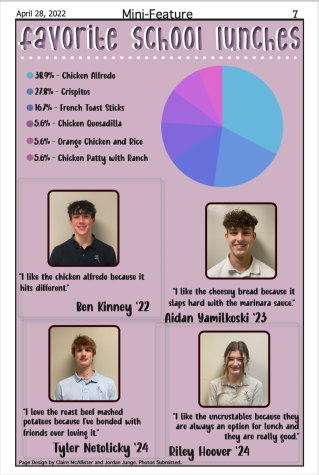Cooking counts
March 11, 2020
They start their journey in the kitchen, prepared to make an exquisite meal. They carefully pull a pot out from the drawer and set it on the stove. Then, they procure a lovely box of Kraft Mac & Cheese from the low shelf in the pantry. They dump cartoon-shaped noodles into the pot while turning on the stove, making sure to ignite the burner. Then just like they had seen done many times before they add some milk, butter and a cheese packet. After waiting what seems like a reasonable time, they turn off the burner and transfer the noodles to the waiting bowl. Excited by their amazing cooking skills, they grab a spoon and dig into their culinary masterpiece. They take their first bite, expecting the wonderful taste they know so well, but are surprised to find that it tastes absolutely disgusting. They don’t dwell on the failure too long and moved on, only realizing later that they had missed one crucial step in the making of Mac & Cheese. This important step they forgot? Well, they may have forgotten to, you know, boil any water first. This person who forgot probably the most obvious step in Mac & Cheese, well that person was me.
Today, I no longer forget to put water in my Mac & Cheese, one of the many things I’ve learned over the years when it comes to cooking. While many people out there can at least make some Mac & Cheese, there’s a real benefit to learn how to make more than just the basics when it comes to cooking. As we prepare to leave high school and go off to live on our own, one of the vital things to learn is how to cook for oneself.
One of the big benefits of learning how to cook is the fact that it saves money. The average person spends thousands of dollars per year eating out at restaurants, money that could be significantly reduced by cooking for themselves. Another great benefit is food made at home is generally healthier than other alternatives. This is mainly because the person controls what goes into their food and will usually add less unhealthy ingredients like butter and salt. Cooking for oneself also promotes a sense of accomplishment, much like my joy of cooking Mac & Cheese by myself for the first time. This accomplishment will make any meal taste just a little bit better than food at a restaurant. One last benefit to learning to cook is that cooking tends to be faster than going out. When you add up all the drive time and wait time at a regular restaurant, it’s usually much longer than cooking at home, and when you’re hungry, every minute counts.
Some people may say that cooking is boring and takes too long. To these, I say there are many ways to make cooking enjoyable, like doing it with someone else and making it a race, or trying to cook in unusual ways like cooking steak over the open flame of the stove or making a meal using only a few random ingredients. In the end, while not everyone out there can become a Michelin Star chef, it would do everyone good to learn their way around the kitchen.
Jack Renning
Opinion Writer



